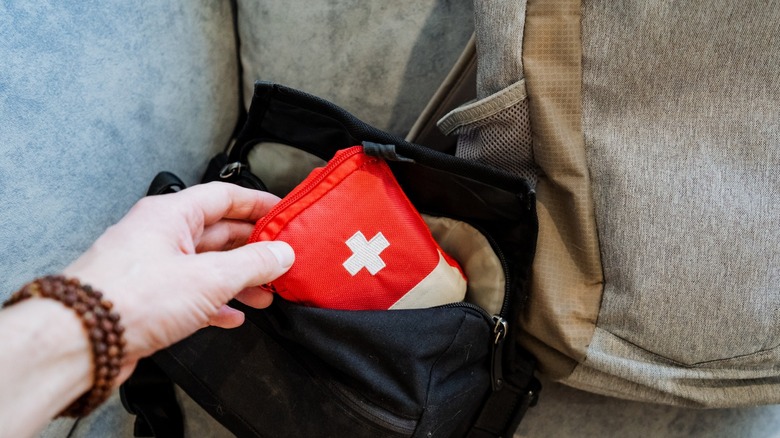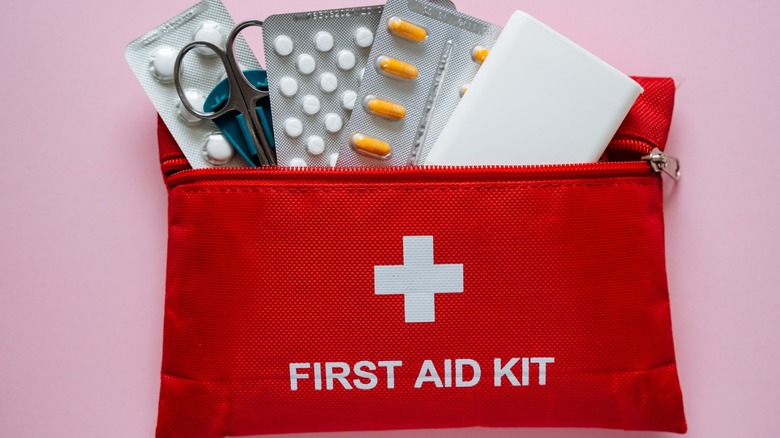What Needs To Be In Your First Aid Travel Kit Based On Your Vacation Plans, According To The Red Cross
We may receive a commission on purchases made from links.
Turns out the old adage "better safe than sorry" holds a lot of water when it comes to traveling while being medically unprepared. As reported by the CDC, over 1,500 U.S. citizens died while traveling overseas between 2019-2021. Even accounting for the fact that the majority of those incidents were due to car accidents, injuries like cuts, falls, asthma attacks, and bone fractures are also common risks associated with adventure and travel. So, whether you are considering a short day trip, a road trip, or a vacation to an exotic destination, it's better to have a first-aid kit with you and not need it, than to need one and not have it.
The Red Cross recommends a comprehensive list of items travelers should pack in their first aid kits — and it goes way beyond the basic kits you put together as a Boy or Girl Scout. Adhesive tape, alcohol wipes, slings, and gauze are obvious for your run-of-the-mill cuts, sprains, swelling, and strains, but less-thought-of items include instant cold packs, scissors, a thermometer, and latex-free exam gloves. In the event of emergencies or more serious incidents, travelers should also consider carrying items such as butterfly wound closures, trauma pads, a light stick, and a whistle.
Pack according where you're going
It's hard enough considering what clothes to pack for a trip, but one an way to choose what to squirrel away in your first aid kit is to think about where you're going. If you're a wilderness lover who loves camping, Red Cross first-aid camping kits are a must-have. Some key things on their checklist are topical corticosteroids for bites, stings, and other skin irritants (think poison ivy), tweezers (for removing ticks, per CDC recommendation), splints, and an emergency blanket. If you are in a remote location far from medical facilities, consider bringing items like quick clot gauze and SOF tactical tourniquets, both available on Amazon.
While the Red Cross includes insect repellent as a good way of keeping away pesky bugs while camping, you'll especially want to pack it if you're traveling abroad — especially since mosquito-related illnesses like malaria and dengue remain serious threats worldwide. Food poisoning is also a big issue while vacationing overseas, with 50,000 cases reported annually. With that in mind, it makes sense that anti-diarrhea and antacid medications are also on the Red Cross' list of travel essentials.
Pre-existing conditions are one of the surprising things travel insurance probably doesn't cover and, depending on how remote your destination is, or which country you're going to, access to medications varies. That said, if you have a chronic condition, it's best to bring those medications with you — especially if they're lifesaving implements such as inhalers, EpiPens, or oral glucose tablets. The Red Cross also recommends checking off a list of general medications you may need, such as antihistamines, eye drops, pain relievers, and sunburn treatments.
Pack according to who you are
If you're a parent who also has to pack for children, the Red Cross has ready-made family first aid kits for that scenario. Chewable aspirin tablets, antibiotic ointment, hydrocortisone cream packs, a CPR face shield, and elbow and knee bandages are just some of the useful items in the pack. However, you are always welcome to pick and choose which ones are best for your specific trip.
If you are bringing a baby or toddler with you, consider packing additional grooming items like a toddler brush, comb, nail clipper, and a fingertip toothbrush. Health items to also consider include nasal aspirators, digital thermometers, medicine droppers, and comfort-tip medicine spoons. For those who are uncertain about how to use any of these first aid kit tools, the Red Cross' "Wilderness and Remote First Aid Emergency" reference guides and student training kits can help you practice crucial application and lifesaving skills.
Whether you are replenishing your kit or starting a new one, the Red Cross Store offers a wide range of products and bundles. If you're trying to pack your suitcase as efficiently as possible, they also have pre-packaged, miniature first aid kits that come in lightweight, cloth bags, making them easy to fit into carry-on backpacks and purses. As a last note, if you're packing anything in pill form, the best way to pack your medicine is to bring it in its original container to avoid possible confusion (or confiscation) when going through customs.


